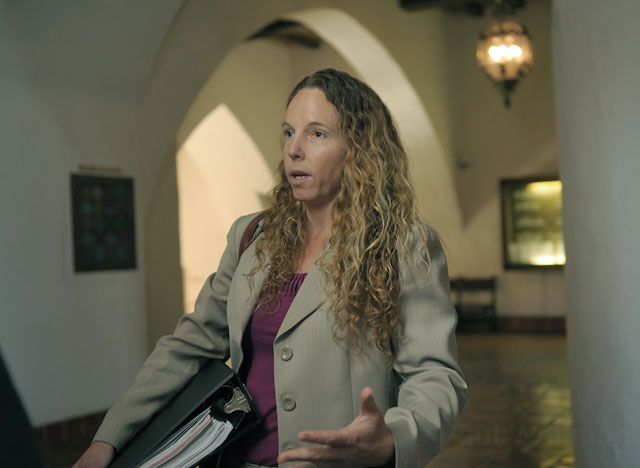Injunction Goes to Juvie
Judge's Ruling Creates Major Hurdle for City Gang Case

A juvenile court judge will have to decide whether the city can use juvenile records to bolster its case for a gang injunction, Santa Barbara Superior Court Judge Colleen Sterne said Tuesday morning.
The proposed injunction, which the city unveiled last March, would create safe zones throughout Santa Barbara in areas known as gang hangouts and where gang crime is common. Identified gang members would, among other things, not be allowed to congregate with other gang members or wear certain clothing in those areas.
Contained in more than 1,200 pages of evidence the city has provided to defense attorneys representing 30 alleged gang members named in the proposed injunction is juvenile information about more than 100 people that those defense attorneys say is confidential and should not be out in public. There is a general policy of confidentiality in the juvenile court system.
To prove its case, the city is attempting to show a pattern and practice of gang activity that has created a nuisance within the safety zones. The safety zones were created based on statistics. “It’s imperative to go and establish as much gang activity as we can,” Chief Assistant District Attorney Hilary Dozer said. The evidence at issue is in the form of declarations from officers in the Santa Barbara Police Department who outline hundreds of encounters with alleged gang members.
The city argued that the contested information was not taken from actual juvenile-court case files and thus is not subject to protection under the Welfare and Institutions Code. Defense attorneys, however, argued that the law expands to include juvenile “run-ins with law enforcement,” as well as other documents and information, not just what is contained in a file. “Defendant is defending the confidentiality of a juvenile’s record whether it is an arrest, a contact or a mere brush with the law,” wrote attorney Tara Haaland-Ford in papers filed with the court. “[The city is] seeking to use the individual defendants’ youthful brushes with the law to stigmatize them as ‘gang members’ based on their juvenile run-ins with law enforcement,” which is neither the intent, nor the spirit of the law, she said.

The judge agreed and said such material is confidential. That means the only way to access it is by petitioning the juvenile court. Sterne, in her ruling, noted a specific part of the code, which says, “The juvenile court, which is in the best position to determine whether disclosure is in the best interests of the minor, has been vested with exclusive authority to determine the extent to which juvenile records may be released to third parties.”
The judge for the juvenile court, Thomas Adams, issued a temporary restraining order on February 6 preventing those in possession of the files from reading, copying, or disseminating their contents. On February 28, the matter will be back in front of Judge Adams, who could make the temporary order permanent.
So the city — in order to use the information in its case — must petition the juvenile court for access. As part of the petition, the city must notify the person whose information they are trying to make public, as well as that person’s parents (if he or she is still a juvenile), and his or her attorney. Adams will then have to decide, on a case-by-case basis, whether the person’s right to have his or her juvenile court file remain confidential outweighs the use of the information in the civil case.
This process will take some time, depending on how many of the case files of the more than 100 — possibly up to 200 — people listed in the evidence the city decides to pursue. Depending on the judge’s ruling in each instance, the city’s ability to prove its case could become more difficult. At the very least, the ruling means the civil injunction trial, which was set to go to trial March 5, is delayed until July at the earliest.
While some defense attorneys saw the decision as significant, Dozer downplayed the implication of the ruling, saying it was one step in a long process toward a gang injunction. He anticipated the court making the decision. “It was a legitimate area of dispute,” Dozer said. “[Sterne’s ruling] doesn’t mean it wasn’t worth litigating.” The city proceeded the way it did to try to expedite the proceedings, he explained.
Dozer said he doesn’t anticipate any roadblocks moving forward. The juvenile court could hold back some information, he said, but most of it will come without too much difficulty, because it is for a public-safety reason. “We don’t consider it a major impediment on a long road we intend to go down,” said Dozer, noting it took up to five years for other jurisdictions to get a gang injunction legally in place.



